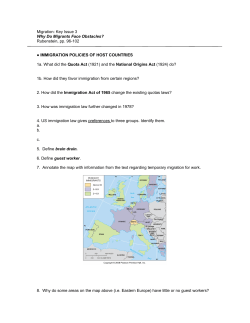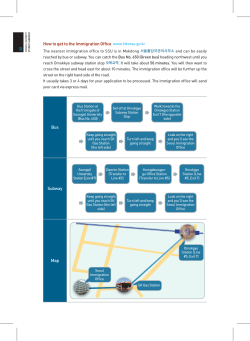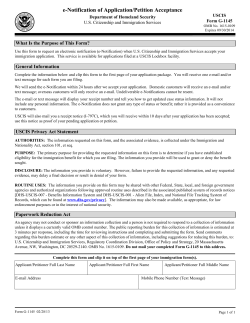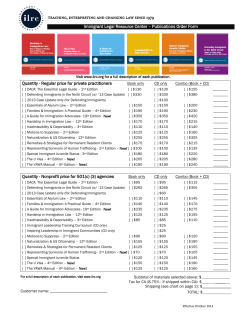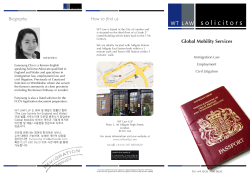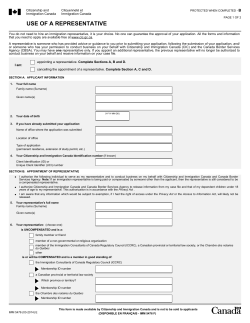
FYS 046 Immigrants and Refugees
Immigration and Refugees Fall 2014: TR 12:30-1:45, F 11 Prof. Eleanor Zeff (eleanor.zeff@drake.edu) FYS 046, CRN 7331 Meredith # 228 Meredith #209, #271-3102 Office Hrs. = MTW = 1:45-3:30 Introduction: “Immigration is a form of migration that signifies the intention of a person to settle permanently in a new country. Motivating factors are generally economic, social, and political. Despite a long history in the United States and some other countries of receiving immigrants, most people who move from one country to another do not intend to leave their homelands permanently. In recent decades, millions of people have been driven by civil war, natural disaster, and persecution to seek safety outside of their countries. Millions of others leave for temporary work.” (DSM magazine, Aug. Sept. Oct. 2013). Refugees, Who are they? Refugees are legal immigrants; invited to live in the United States (and Britain and France, etc.) after they have fled from their home countries, which are experiencing violence, war, or political, ethnic or religious persecution. Refugees differ from legal or documented “economic immigrants” who come seeking work and a better way of life. There are 10.5 million refugees in the world. In 2012, the United States admitted 58,238 refugees; Iowa admitted 439, making the state No. 33 in the number of refugee arrivals, according to the Iowa Bureau of Refugee Services. In 2013, Catholic Charities and the US Committee on Refugees and Immigrants together settled a total of 455 refugees. (DSM Magazine). Course Description (major topics, general description): The course will explore the political, economic, and social factors that affect immigration, refugees and the making of policies to handle these issues in the United States and, for comparison purposes, in Britain and France, countries with liberal democracies and factors which are also “pulling” (attracting) refugees. It will include discussion of the implications of immigration history and changing policies in countries sending and receiving immigrants, and of different ways of resettling refugees and handling the problems of diversifying communities. The community will serve as an” active text book” so that students gain first-hand experiences of immigration and refugees issues. Students will develop a multicultural perspective on Iowa through service learning projects with local organizations that work closely with refugees and/or immigrants (i.e. Lutheran Services, and First Christian Church). The intention of the course is to integrate/link the international and national components of immigration with local problems and issues, and to analyze how immigration policies develop from a combination of factors including history and existing conditions in both the sending and receiving countries. To facilitate this process, students will also read and reflect on assigned readings, news articles and editorials concerning immigration and immigration policies (especially US policies). Some Learning goals include: Students will not be expected to be immigration experts by the end of the semester, but they should have expanded their knowledge about immigration and learned how the Des Moines community uses its resources for refugees and handles problems such as refugee resettlement and increasing diversity in the community. More importantly, students should improve their abilities to gather and conduct research on international and local issues as well as to critically analyze this information. By studying and reflecting on an important international issue facing the US today, and looking at how this problem is addressed in the Des Moines area as well as in national and international politics, students should grow as informed citizens, equipped with new skills to be able to critically assess various problems and engage more effectively in their communities. Specific goals: 1. Learn about immigration and its history at international, national, regional and local levels. 2. Improve research techniques in order to find out and write about immigration history, policies and learn individual stories. 3. Learn about the Des Moines community and its policies on immigration and handling of refugees, and work with individual refugees. 4. Experience and learn how community problems become national and state policies. 5. Write and reflect on immigration policies and learn to express ideas through improving writing skills. 6. Discuss refugees and immigration policies in both small group and classroom settings and assignments so that you become better communicators. 7. Through assigned readings, written assignments on these readings and class discussions covering the readings, improve critical reading skills and analysis techniques. 8. Become more informed and engaged citizens. Professor’s Expectations: Attendance: Students are expected to attend all classes and attendance will be taken on a regular basis. More than three unexcused absences will result in a lowered grade (a B becomes a C). If you must miss class, please inform the professor as much in advance as possible, especially if an exam or written assignment is due. Please do not skip class if you have not completed a written assignment. You are only compounding the problem as we often discuss the papers in class, which might be helpful to you if you are having problems. Please come to me with problems about time management, missing assignments or not understanding class content or class expectations. There is more on attendance on the class policies sheet. Participation: Please come to class on time and prepared to stay for the entire class period. It is disruptive when students come and go during the class period. If you have to leave early, let me know before class starts. Please turn off your phones and other equipment during class. There might be times when you can use your computers in class, but I will let you know when you need them. Otherwise, they should be turned off once class starts so that you can fully participate in class activities. You will be graded on your participation. The class is designed to be a lecture-discussion and hands-on course, with emphasis on improving writing skills and getting to know the nearby community. You will be doing writing assignments to help link the class readings and discussions with your volunteer experiences. The assigned readings are important to give grounding to the discussions. Please keep up with the readings to be able to participate meaningfully in class. I may give you questions about the readings, or short written assignments or a quiz on the readings, in order to help you think critically about what you are learning. Experiential learning component: The lab component of this class consists of doing experiential work in the community. You will be expected to commit to 4 hours a month for 3 and a half months, starting in the beginning of September and running through the beginning of December. You may opt to do two hours at a time for 2 times a month, or one hour each week, or however your schedule works best to fit in time for this volunteer work. You should plan to do @12 hours of work with refugees and immigrants in the nearby community during the semester. There will be a few class times when we will not meet in order to compensate you for the extra time you will spend on this experiential class component. I will keep some class times open to meet individually with you as well. To contact Drake’s Service Learning Center on Blue View, use: http://www.drake.edu/servicelearning/. I will give you each a contract to sign concerning your responsibility to this position and your participation and comportment when you are representing Drake off campus. Class Requirements: 1. Assessment assignments: A midterm exam (short written/essay answers) covering the assignments = 15% and 3 written critiques of readings/DVDs (@250 words each). (5 points each, 15%) = 30% 2. 2 papers = 30% (15% first paper on your family immigrant experience and 15% for the second paper, which will be an annotated bibliography, including research on immigration policies and theories and readings about immigration and refugees). More information about writing an annotated bibliography will follow. Instructions for both papers will be handed out in class 2 weeks before each assignment is due. 3. A Final Exam = 15 % - The exam will consist of short essay questions and will be administered in class during final exam week. Study guides will be provided one week in advance of each exam. 4. A journal reflecting on the experiential component of working with refugees (15 %). 5. Participation = 10%: Participation = active/respectful involvement Assigned Readings and Other Assignments: There are two assigned books for purchase or rent for the semester. 1. Immigrants and Refugees, A Course Packet consisting of recent book chapters and news articles compiled by Dr. Zeff for this course on Immigrants and Refugees. 2. The Politics of Immigration in France, Britain and the United States by Martin Schain, Palgrave/Macmillan, 2nd Ed. 2008. Copies have been ordered by the University bookstore or you may buy the books online or share or rent these books, but you will be responsible for the assigned readings from the books. 3. Students will also read articles and laws, which will be posted on the Blackboard or found online as indicated. Also to be read are some current immigration laws, which you can find online: 1. DIRECTIVE 2008/115/EC OF THE EUROPEAN PARLIAMENT AND OF THE COUNCIL of 16 December 2008: on common standards and procedures in Member States for returning illegally staying third-country nationals. 2. In the US, the Immigration and Nationality Act (INA) provides the foundation for immigration law. It was passed in 1952 and has been amended several times since (The USCIS webpage provides a list of amendments to the INA by public law number since the 99th Congress). The INA is found in Title 8 of the United States Code. 3. US Department of Homeland Security is now in charge of: U.S. Citizenship and Immigration Services USCIS, U.S. Immigration and Customs Enforcement, and U.S. Customs and Border Protection: 4. Some weeks, students will be required to find a news article or editorial. Students can find editorials in newspapers such as the New York Times, the Wall Street Journal, the International Harold Tribune, the Des Moines Register or other regional papers, etc. We will discuss these editorials in class each week, so students should come prepared to present the topics they found, some of which might be controversial and so interesting to discuss. Students should try to find different opinions about the pros and cons of immigration in these editorials. Students can find articles and newscasts by listening to the BBC or NPR nightly newscasts, a few times each week, and may use at least one newscast for this assignment on immigration affairs. Students watch several Videos and Documentaries and discuss them in class. Some include: Principle’s Public Dialogues: on YouTube: Lori Chesser: “The Obstacle Course to Citizenship; The Immigrant Journey” and Dr. Mark Grey: “Our Immigrant Neighbors”; Jody Swilky’s documentary on immigrant experiences in Marshalltown, Iowa (“A Little Salsa on the Prairie) and a Documentary on the Postville, Iowa raid. More Information on Assignments: Reading quizzes: (2 quizzes on the readings for 5 points each). The short quizzes will consist of short-answer questions that invite you to reflect upon a limited range of course readings. The quizzes and short papers encourage your attendance and active participation in the course, encourage you to complete the assigned readings on schedule, and facilitate your understanding of key facts, ideas and arguments. Please bring all reading materials with you to class on the day they’re scheduled for discussion. For Blackboard materials, this means a hard or electronic copy of the article—or good notes on the article. Academic dishonesty: is a very serious offense, and will result in a failing grade on the assignment in question and possible failure in the course. It includes cheating on in-class examinations, copying another’s work, representing work (research, thinking, writing) done by others as one’s own, falsifying information, failing to acknowledge assistance given by others (tutors, fellow students, faculty), and other forms of misrepresentation. If you have questions about what constitutes academic dishonesty, please consult the Department’s and College of Arts & Sciences’ statements:(http://www.drake.edu/artsci/PolSci/PolSci_Home_Page.html#Honesty and http://www.drake.edu/catalog/ugrad/artsci/reg.php). Course Outline (Fall 2014): August 26: Go over the syllabus and other class handouts and class policies. Discuss the experiential learning/volunteer tutoring experience. Begin to sign up for experiential learning times, and complete other documentation. August 28: Show the DVD: “A Little Salsa on the Prairie” and take notes so that you can write about the topics discussed in the film. Discuss the video, “A Little Salsa on the Prairie” in class if time. September 2 (Tuesday) Immigration Experiences in Iowa Assignment: Come prepared, with short written answers to the following questions about the DVD, (1st short critique) = A Little Salsa On the Prairie. We will also discuss these questions in class. This exercise should help you think critically about the film and remember the themes better so you can actively participate in a class discussion. We will go over them in class and you will hand them in after class. 1. What was the main theme of the DVD? 2. Who were the main characters and what was happening to them? 3. What obstacles did these characters face? 4. What was controversial about the film? 5. Did the story have a thesis? (Was it for or against diversity and immigration?) 6. What did you learn from the film? 7. What did the characters do to solve the problems they faced? 8. Do you think that these problems are similar to the experiences of other immigrants? 9. What might be different about the problems that immigrants today face that they did not face in earlier days? Sept. 4: The class has a Library Session in the Cowles Library in room 201. You should meet in the Library at 12:30 in room 201. Do not go to the classroom. Go directly to the Library and bring a laptop if possible as 201 does not have computers and you will need to work on a computer during the session. Assignment: Each of you should come to the Library with some questions. Your assignment is to try to find information about the immigration history of your own family as well as to research immigration laws from 1980 to 2013. You need to start your research on the topic before you come to the Library, so you know if you are having problems. At the session, you may ask any questions you had about finding sources and using these sources for research on your immigrant history. Finding appropriate research and sources is the first step in writing a good paper. Read: Course Packet: “What is Immigration?” pp.1-10. Friday, September 5 We have an introductory session at Lutheran Services of Iowa, which will only last about an hour. LSI is located across the street from Aliber on University Avenue. September 9: Immigration in Iowa, the Iowa Immigrant Experience Assignment: Today you will hand in the second (typed) of the three short assigned papers on A Little Salsa on the Prairie. For this short paper, you will choose two or more of the class questions above as the basis for a short essay. In class, we will discuss any problems you had in writing this paper. Were you able to come up with a topic sentence? The paper should only be about 200 to 250 words (short and sweet, with no grammar or spelling mistakes, and appropriate citations). Reading: Next we discuss the Heroic Journeys reading from the Course Packet, pp. 47-54, and the experiences of these immigrants. Were they similar or different from the experiences of immigrants in the film? Did anything surprise or speak to you from reading these stories? We are working to add to our knowledge about the immigrant experience in Iowa. Begin to think about your own immigrant experience and come to class prepared with information or research about your own immigrant experience. Finally, we discuss your experiential placements. Sept. 11 Read: “Immigration in Iowa” in the Course Packet, pp. 39-42; “The Facts”, pp. 21-38. Work on researching your own immigrant history. If you are adopted, you can look into your adopted family’s story and/or perhaps you know a little about your own background as well. If you do not feel comfortable researching your own immigrant stories, you may choose to do your hometown’s story (like the Perry DVD we saw). One purpose of this exercise is for you to learn to do research on a particular topic (here immigration) and include personal research as well as library or Internet research, and then to use your research in written papers. Discuss volunteering. Sept. 16 and Sept. 18: Discussion of immigration laws, policies and Refugee stories; Perhaps a visit from a recent immigrant, to talk about his/her experiences as an immigrant in Iowa. What is the difference between immigrants and refugees? What is refugee status? Read: The articles on Immigration Reform; pp. 11-18; 19-20 and 81-82, and “Fixing Immigration from the Ground UP”, pp. 101-102, and “Border Security”, pp. 55-78; “Immigration Reform Falls to the Back of the Line”, pp. 97-100 and Blocking Parts of Arizona Law___”, pp. 93-96 in the Course Packet. We will also spend time in class discussing your expectations for your experiential learning experiences. You need to plan for writing a journal each time you go, noting what you did (observed, with no judgment), and then in a second column, you will put what you learned about immigrants and/or about problems or policies in the Drake area community. Sept. 23: Problems of Immigration Read: “The Heartache of an Immigrant Family, pp. 43-45, “The Health Toll of Immigration”, pp. 103-106; and The Aging of US Farm Workers”, pp. 107-108. Assignment: Review immigration readings and class discussion notes up to this point for guided class discussion, which will also be a preliminary way to study for your midterm exam. Sept. 25: Migration Read: “Migration, pp. 83-92 and International Migration in Perspective, pp. 141-154 in the course packet. We will discuss your papers on your immigrant experience. September 30: Turn in paper on “My Immigrant Experience” (15%); Discussion. Oct. 2: Free Day or meet individually with Professor Zeff in Meredith 209. Oct. 7: Midterm Exam Review Oct. 9: Midterm Exam Oct. 14 = Fall Break = No Class Oct. 16: Comparing Immigration Challenges in Europe and US: Ethical Issues Read: National Design in a Globalizing World, pp. 109-124 in the Course Packet. Find an article and be prepared to discuss. Oct. 21; Oct. 23: Politics of Immigration and Migration in Comp. Perspective Read: M. Schain, Ch. 1; and Assignment: Start thinking about relating your personal experiences of working with refugees to the bigger picture of refugees in general; i.e. why they came to the US or left their countries, and the problems they face when moving to a new country such as the US or France, etc., and how these problems should be addressed in an Immigration Reform Bill. Oct. 28 and Oct. 30: Immigration Policy Making/Law in the US: Politics of Immigration Read Ch. 10 in Schain, Also, Find an article about US citizens views on illegal vs. legal immigration or one that discusses legitimate problems with immigration. Some of these fears and issues have driven policy making for 100 years. Why is there more opposition in individual States than in the Federal Government? “US Immigration Policy in Historical Perspective”, pp. 125-140 in the course packet. Write critique (short paper #3) on readings on US Immigration. Nov. 4: The Politics of Immigration in France Read: M. Schain, Chs. 2 and 3 Nov. 6: Comparing French and US Immigration Histories and Policies Read/Assignment: M. Schain, Ch. 4, Write a brief synopsis comparing French immigration policies and problems to American policies and problems to discuss in class. Nov. 11: Immigration in the United Kingdom Read: M. Schain, Chs. 5 and 6 Nov. 13: The Politics of Immigration in The United Kingdom (Great Britain) Read: M. Schain, Ch. 7. 2nd quiz on comparative immigration, the US, Britain, France. Nov. 18: Annotated Bibliographies due in class, followed by group presentations. Nov. 20: Discussion continued of Annotated bibliographies. Find an article on topic. Nov. 25: No Class (day to make up volunteer time commitment). Nov. 27 = Thanksgiving Break : Dec. 2 = Hand in and be prepared to discuss your experiential learning journals. Dec. 4 = Discussion of papers and learning journals. Review day for final exam Week of December 7 = Final Exams
© Copyright 2025
